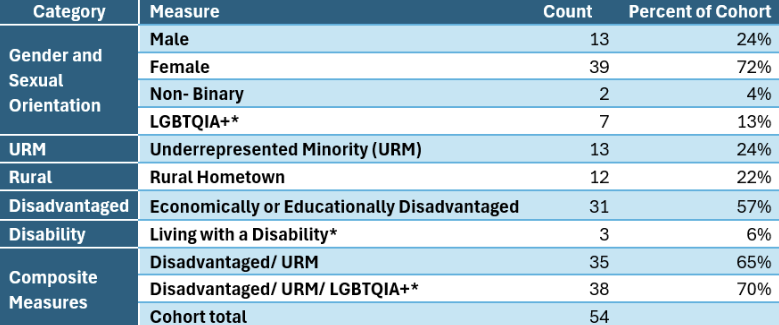What is a Disparity Impact Statement?
A DIS is a framework for monitoring programs. It has most often been used in clincial settings, and HRSA has asked the Public Health Training Centers to apply it to workforce development.
A formal definition is:
The DIS “Provides the contextual and measurement framework for ongoing monitoring and determination of a project’s impact on the OMH’s mission to promote minority health and address health disparities experienced by minority populations.”
For NEPHTC, our DIS framework helps us understand who is applying to the program, who is accepted to the program and their experiences and learning outcomes, and how those measures vary by different characteristics. This allows NEPHTC to take a data-driven quality improvement approach to address disparities.
NEPHTC’s commitment to impacting disparity in the Health Equity Student Stipend Program is twofold:
“we will increase placement opportunities for students who are under-represented minorities or come from disadvantaged backgrounds.
Additionally, our program will offer tailored projects and capacity building for all participants to increase their confidence and competencies to work with diverse communities”
Some DIS data NEPHTC monitors includes:
Student Characteristics**

**Participants 7/1/23-6/30/24
*Due to nature of questions, may be an undercount in FY23
Agency Characteristics
| LGBTQ Serving | MUA/P Serving | Rural Serving | Total Students |
| 16 | 45 | 17 | 54 |
Populations served:
Diversity
| Adolescents | 29 |
| Children | 26 |
| Chronically ill | 17 |
| College students | 12 |
| Homeless individuals | 18 |
| Individuals with HIV/AIDS | 10 |
| Individuals with mental illness or substance use disorders | 19 |
| Lesbian/Gay/Bisexual/Transgender | 16 |
| Low income persons/families | 41 |
| Migrant workers | 7 |
| Military and/or military families | 4 |
| Older adults | 15 |
| People with disabilities | 20 |
| Pregnant women and infants | 12 |
| Refugee Adults | 5 |
| Returning war veterans (Iraq or Afghanistan) | 3 |
| Tribal Population | 3 |
| Undocumented Immigrants | 12 |
| Unemployed | 22 |
| Uninsured/Underinsured persons/families | 31 |
| Veterans | 4 |
| Victims of abuse or trauma | 10 |
Summary for Host Organizations for participants 7/1/23-6/30/24
